-
(单词翻译:双击或拖选)
VOICE TWO:
And I'm Barbara Klein with EXPLORATIONS in VOA Special English. Today we tell about five individuals around the world who are making a difference. They are making the world a better place by helping2 people in special ways.
(MUSIC)
VOICE ONE:
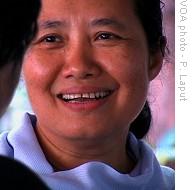 |
| Cynthia Maung |
Our first individual who is making a difference is a refugee from Burma. Thousands of people flee Burma each year to escape poverty, oppression and civil war. Many of them choose to stay in Thailand. Cynthia Maung is a Burmese doctor who operates a small public health center near the Thai border with Burma. She is making a difference in her community by providing services that are not available to most people in this area.
VOICE TWO:
Many people are waiting at the public health center. Mothers and their children wait in line to get vaccines3 to protect them against diseases. In another line, parents with newborn babies wait for documents that show their babies were born in Thailand. The documents take the place of birth certificates. Thai officials do not recognize these people because they are refugees. But Doctor Cynthia Maung does.
VOICE ONE:
Doctor Cynthia, as she is called, fled Burma in nineteen eighty-eight after a military campaign against people who demonstrated for democracy and justice. She says she joined with the demonstrators. She says people started disappearing or fleeing to the border when Burma's military seized power. She decided4 to settle near the border to work for political change.
VOICE TWO:
In a small building, Cynthia Maung started performing operations and helping women give birth. She cleaned her instruments in a rice cooker. She also trained young volunteer health workers. Today, those workers treat people for landmine5 injuries and many diseases. Her health care center receives donations of money from non-governmental organizations and foreign governments, including the United States.
Doctor Cynthia makes a little money go a long way. Each year, one hundred fifty thousand people come for treatment. Those who can, pay less than one dollar.
VOICE ONE:
Doctor Cynthia lives next to the health center. She says the workers there do not only treat diseases. They also educate young people who go back and support health activities in their communities. For example, the center trains volunteer health workers who go back to work in the ethnic6 Karen and other areas of Burma. Some of the volunteers are former patients who are now helping others. Doctor Cynthia says young people should be taught not to feel like victims. Instead, she says, they should see themselves as people who can change and improve their situation.
(MUSIC)
VOICE TWO:
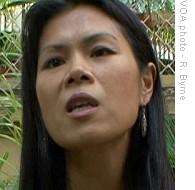 |
| Theary Seng |
Theary Seng is a human rights activist7 working to heal her country, Cambodia. As a child, she lived through the rule of the Khmer Rouge8 during the nineteen seventies. During four years in power, the Khmer Rouge was responsible for the deaths of at least one million, five hundred thousand Cambodians. Theary Seng's parents were among those killed. After the fall of the Khmer Rouge, she escaped to Thailand and then went to the United States. She attended law school and became a lawyer.
VOICE ONE:
Now, Theary Seng is back in Cambodia, supporting human rights as the head of the Center for Social Development. She is a critic of corruption9 and abuse wherever it exists -- in Cambodia and around the world. At a recent demonstration10 in Phnom Penh, she attempted to leave flowers to honor those killed in the civil war in the Darfur area of Sudan. But Cambodian government officials prevented her from doing so.
VOICE TWO:
Theary Seng takes a special interest in the Khmer Rouge Tribunal. The court is starting to take legal action against former Khmer Rouge leaders for their crimes. She serves as an official representative for the victims.
She also has a television show. It seeks to find the country's next generation of young leaders. Theary Seng says her work is not to do anything big but to be a common citizen in her homeland where she suffered in the past.
THEARY SENG: "And now, I'm taking that suffering, and shaping it into hope, and trying to work with individuals who had not the time and space to heal that I've had."
(MUSIC)
VOICE ONE:
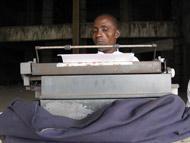 |
| William Saydee at his typewriter |
William Saydee is making a difference in his country, Liberia. In Monrovia, the capital, the sound of typing mixes with the sound of cars in the street. Mister Saydee is a clergyman and former accountant.
(SOUND)
He now works as a typist and teacher. He is teaching unemployed11 Liberians how to type. The students do not pay him anything. One of the students is Isaiah Thomas. He says he is learning to type because he wants to work for an international company.
VOICE TWO:
William Saydee says he wants to help young people gain a skill to succeed. He says it is the best he can do to help Liberia re-build after years of civil war.
Mister Saydee earns money by typing contracts and other documents, like resumes. A resume is a list of a person's education and work experience. It can be useful when a person is looking for a job.
(MUSIC)
VOICE ONE:
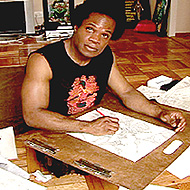 |
| Cartoonist Robert Walker |
Comic book artist Robert Walker is making a difference in New York City. He uses his art to help people understand the disease AIDS.
Many children and even adults in the United States enjoy reading comic books. Superheroes in comic books have unusual abilities. They use their abilities to help people and save the world. Like most superheroes, Mister Walker's characters have special powers. For example, one superhero can see in the dark. One can lift more than three hundred tons. Another can come back from the dead. Also, like most superheroes, his characters have to deal with trouble. These superheroes all have H.I.V., the virus that causes AIDS.
VOICE TWO:
Mister Walker says some members of his family died of AIDS when he was a child. That gave him the idea to create a comic book called "O Men." It includes nine characters living with H.I.V.
The characters are men and women who represent different races and socio-economic groups. They also were infected with the virus in different ways. Mister Walker says he wanted to fight depressing images connected with the disease.
ROBERT WALKER: "It's not a black disease. It's not a white disease. It's not a gay disease. It's a disease of humanity that lacks awareness12."
VOICE ONE:
Gerry Gladston is the co-owner of Midtown Comics in New York City. He says many comic books have important political, social and educational messages.
Mister Walker spoke13 to many H.I.V. and AIDS organizations in researching his comic book. He says he wanted to make the stories realistic as well as factual.
(MUSIC)
VOICE TWO:
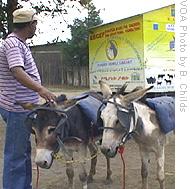 |
| Yohannes Gebregiorgis and his donkeys park the mobile library |
Yohannes Gebregiorgis is an Ethiopian-American who returned to the land of his birth to make a difference. Yohannes, as he is known, became an American citizen many years ago. But he gave up his life as a children's librarian in San Francisco, California. Yohannes says he was concerned that Ethiopian children had no books. He said most schools in Ethiopia do not have libraries. There are almost no children's books in any of Ethiopia's many languages.
So Yohannes started the Donkey Mobile Library to provide children with their first books. His group brings books to children who have none.
YOHANNES GEBREGIORGIS: "Most kids we have noticed holding a book upside down. We have taken pictures of those kids. But later on we find out that those kids learn how to use the book, how to flip14 the pages and to look at the pictures and then gradually to read the stories in the book."
VOICE ONE:
More donkey mobile libraries are planned, with money from groups in the United States. Donated English-language books have begun arriving in Ethiopia. Also, Yohannes has established a publishing company to produce books in languages that local children can read.
His first book was published in three languages. It is a re-telling of an old folk story about, what do you think? A boy and his favorite animal -- a donkey!
VOICE TWO:
In the beginning, children came to the mobile library mainly because of the donkeys. But Yohannes discovered that what really excited the children was the books. He dreams about taking his donkey mobile libraries to more Ethiopian towns and villages. After all, there are millions of other children who want to learn to read.
(MUSIC)
VOICE ONE:
This program was written by VOA correspondents and adapted by Shelley Gollust. Our producer was Mario Ritter. I'm Bob Doughty.
VOICE TWO:
And I'm Barbara Klein. You can download audio and read scripts on our Web site, voaspecialenglish.com. Join us again next week for EXPLORATIONS in VOA Special English.
 收听单词发音
收听单词发音
1
doughty

|
|
| adj.勇猛的,坚强的 | |
参考例句: |
|
|
|
2
helping

|
|
| n.食物的一份&adj.帮助人的,辅助的 | |
参考例句: |
|
|
|
3
vaccines

|
|
| 疫苗,痘苗( vaccine的名词复数 ) | |
参考例句: |
|
|
|
4
decided

|
|
| adj.决定了的,坚决的;明显的,明确的 | |
参考例句: |
|
|
|
5
landmine

|
|
| n.地雷 | |
参考例句: |
|
|
|
6
ethnic

|
|
| adj.人种的,种族的,异教徒的 | |
参考例句: |
|
|
|
7
activist

|
|
| n.活动分子,积极分子 | |
参考例句: |
|
|
|
8
rouge

|
|
| n.胭脂,口红唇膏;v.(在…上)擦口红 | |
参考例句: |
|
|
|
9
corruption

|
|
| n.腐败,堕落,贪污 | |
参考例句: |
|
|
|
10
demonstration

|
|
| n.表明,示范,论证,示威 | |
参考例句: |
|
|
|
11
unemployed

|
|
| adj.失业的,没有工作的;未动用的,闲置的 | |
参考例句: |
|
|
|
12
awareness

|
|
| n.意识,觉悟,懂事,明智 | |
参考例句: |
|
|
|
13
spoke

|
|
| n.(车轮的)辐条;轮辐;破坏某人的计划;阻挠某人的行动 v.讲,谈(speak的过去式);说;演说;从某种观点来说 | |
参考例句: |
|
|
|
14
flip

|
|
| vt.快速翻动;轻抛;轻拍;n.轻抛;adj.轻浮的 | |
参考例句: |
|
|
|















